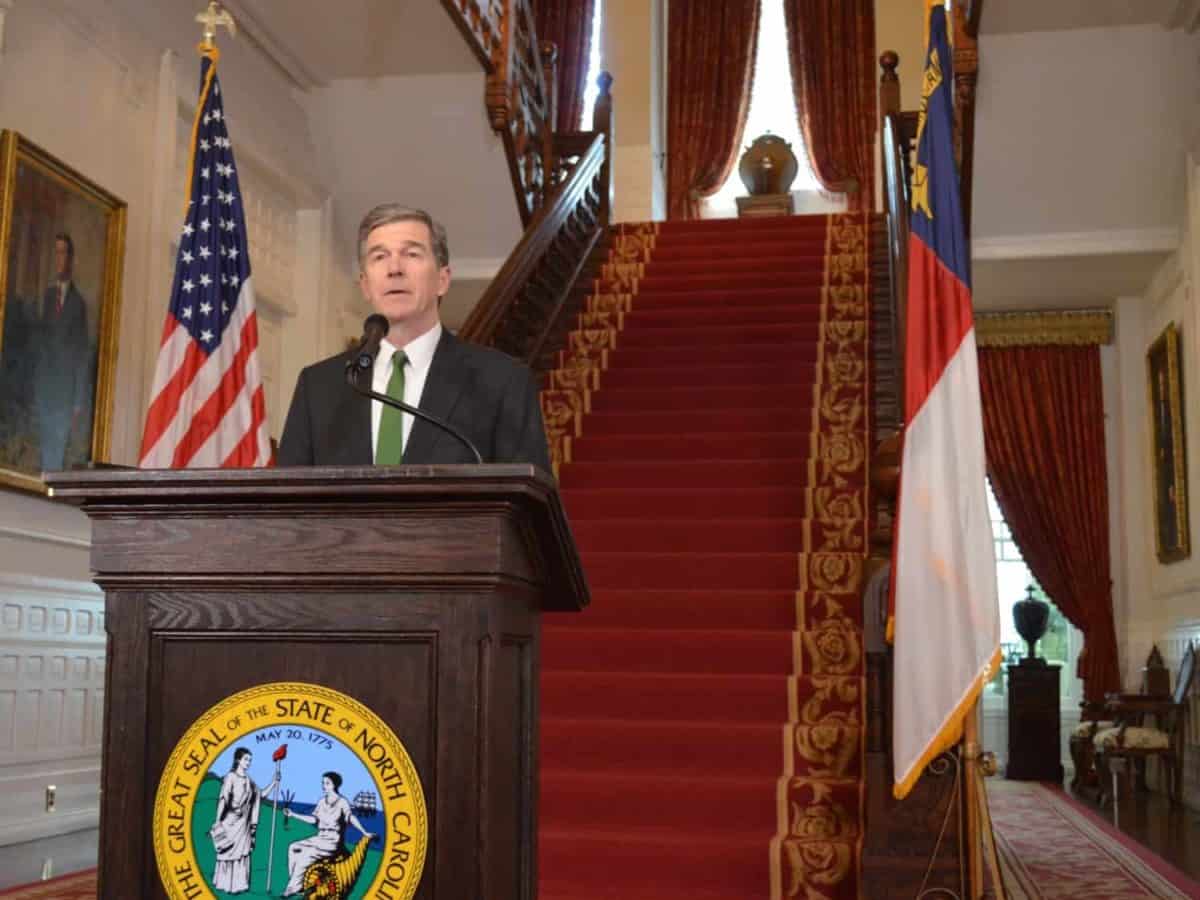
The murky fate of the education provisions in the state budget got a little clearer this morning when House Republicans held a surprise vote to override Democratic Gov. Roy Cooper’s veto and passed it 55-15. There are 120 members in the House, a large chunk of whom were absent.
Democrats were incensed. House minority leader Rep. Darren Jackson, D-Wake, said that he was told there would be no votes held this morning. As a result, he said he contacted fellow Democrats to say they didn’t need to be at this morning’s session.
“If we can’t trust each other, this place will fall apart,” he said at a press conference this morning.
At a press conference at noon, Gov. Cooper condemned House Republicans’ actions.
“Democrats were told there would be no votes this morning,” he said. “It was a bald-faced lie.”
But at a press conference at 1:15 p.m., House Speaker Tim Moore, R-Cleveland, denied these claims.
He said that the budget calendar is published the night before session every day. And last night’s calendar had the veto override on it. He said he has always said that if he sees an opportunity to override the veto, he would take it. And when he came into the chamber this morning, he saw that opportunity.
Jackson called out House Senior Rules Chair David Lewis, R-Harnett, by name, saying he told Jackson there would be no votes this morning. But Moore said that isn’t true.
“Representative Lewis has confirmed to me that he never told anybody there weren’t going to be any votes,” he said.
Lewis spoke at the press conference and said that when he was presiding over the House yesterday, he made public announcements saying that there would be recorded votes today.
“To the very best of my knowledge, at any time that there has been a no vote schedule, the chair has either announced that from the dais, or has sent an e-mail, or both,” Lewis said. “None of those things occurred yesterday.”
Saying more directly whether he told Jackson there would be no votes, Lewis said the following:
“At no time do I recall that Rep. Jackson asked me if there would be any recorded votes at all in the morning session,” he said. “Frankly, when I am asked that, I try to make clear that it is the speaker who decides that.”
Lewis also said that the House had the votes to override the veto yesterday afternoon, but did not vote because Moore said there would be no votes.
At the House session following Moore’s press conference, the topic of the veto override came up again. A number of Democrats who said they were in the chamber this morning but did not have their votes recorded asked to have their votes added to the “no” column. The change didn’t affect the outcome of the veto override.
Jackson said at his press conference this morning that he wanted there to be a motion to recall the veto vote during the afternoon House session. Towards the end of the session, he made the motion. While debating the motion, he again said that Lewis told him there would be no vote this morning, though he added that he didn’t think Lewis was lying to him. Jackson said that Lewis probably thought at the time that there wouldn’t be a vote, especially given the fact that Lewis himself wasn’t in the session this morning.
Lewis responded to Jackson while debating the motion, starting off by saying that Jackson is one of the most honorable men he knows. He went on to reiterate that he had not told him this morning’s session would be a no-vote session. Finally, he asked the chamber to vote “no” on Jackson’s motion. And most of the chamber did. The motion failed 54 to 61.
After the vote, Moore said that if there is going to be a no-vote session, he will be the one to say so. And if he says it, it will be so. Moore didn’t preside over the House yesterday.
With the House now having voted on the override, it goes next to the Senate. Republicans in the Senate need only one Democrat to vote with them for a veto override to succeed.
Gov. Cooper said at his press conference that “Republicans waged an assault on our democracy. They cheated the people of North Carolina.”
He went on to say that the vote this morning was a losing vote for teachers who deserve more pay.
“I believe most North Carolinians believe our teachers should be paid more,” he said. “And this budget pays them less.”
The budget passed by the General Assembly includes an average 3.9% pay raise over the biennium, but all new raises go to teachers with 16 years of experience or more. Teachers with fewer than 16 years simply get their planned step increases. Cooper’s plan would have included an average 9.1% increase for teachers, as well as the restoration of master’s pay.
Cooper said during his press conference that he had spoken with Moore over the weekend about the possibility of “splitting the difference” between the budget’s teacher pay plan and Cooper’s. If the veto override goes through the full legislature, that becomes a moot point.
Cooper’s budget also differs when it comes to funding school construction around the state.
The budget states its commitment to providing about $4.4 billion over 10 years for K-12 school construction and repair. Of that, $1.5 billion will come from the State Capital and Infrastructure Fund, $1 billion from the Public School Capital Fund, and $1.9 billion in needs-based capital funding. Cooper, on the other hand, favored a school construction bond, something that was initially also favored by the House. Cooper said given low interest rates, a bond is the best plan for school construction.
Mark Jewell, the president of the North Carolina Association of Educators, released a statement about this morning’s vote critical of Republicans’ actions.
“The unbelievably deceitful conduct of House Republicans in the General Assembly this morning is nothing short of reprehensible,” Jewell said. “By playing underhanded political games in an attempt to win at all costs, they are subverting the democratic process and destroying whatever shred of trust remained between Republicans and the people of North Carolina.”
The veto override has been on the calendar in the House every day for more than two months. Gov. Cooper and legislative Republicans have been sparring back and forth since then, with Gov. Cooper saying Republicans won’t offer an alternative budget plan and Republicans saying that Gov. Cooper refuses to negotiate unless he gets Medicaid expansion.
In an attempt to get around Gov. Cooper’s veto, the House and Senate have recently begun passing standalone budget bills that handle “non-controversial” provisions from the budget.




